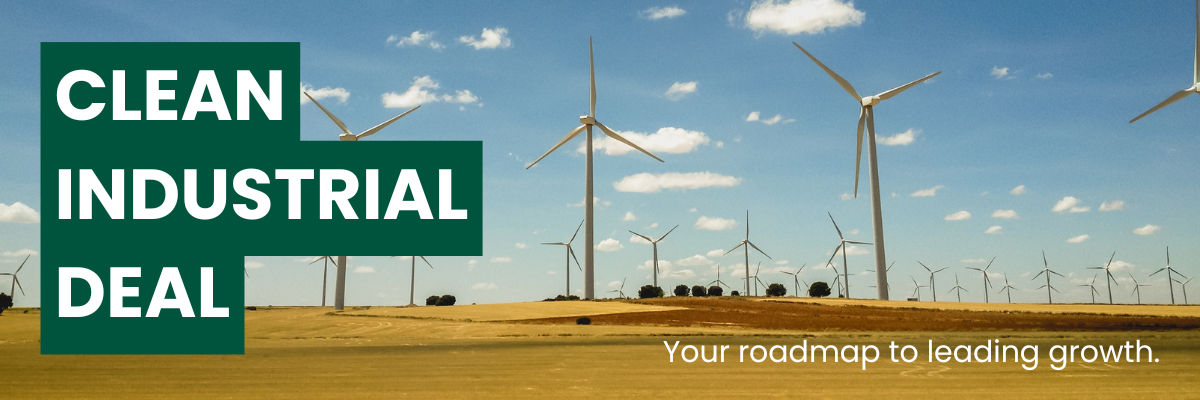
Written by Martijn Meijer
Dear reader,
Welcome to the latest edition of our monthly EU Energy & Climate Policy Update.
Europe’s bold plan for sustainable growth, the “Clean Industrial Deal”, represents a major shift for EU businesses, especially in energy-intensive sectors. Don’t miss your chance to engage with the Commission to shape this deal and influence the policy direction for the next five years.

The spotlight
EU finally ready to ditch Russian gas for good?
After the start of Russia’s war against Ukraine in 2022, the EU didn’t waste time making its stance clear: Russian energy would no longer be welcome.
The war marked the start of Europe’s journey towards a more resilient and independent economy. The EU introduced a REPowerEU Package with measures to wean off Russian gas, while simultaneously hitting Russia’s economy by introducing sanctions; we are now heading into an 18th package (!), with phasing out Russian gas a major focus.
For a while, the timeline and feasibility of a full gas ban remained a question mark; But that’s changing! The EU is turning strong words into concrete action by officially presenting a proposal for a EU regulation banning Russian gas.
Read more to find out what’s being covered!
What is being banned?
Beyond ensuring energy security, the Commission’s objective is unequivocal: to deprive Moscow of critical revenue streams and eliminate the strategic risk of energy coercion. As Commissioner Dan Jørgensen stated, “Russia has weaponised energy against us.” Regardless of any future peace agreement, the proposed ban is intended to remain in place.
The Commission seeks to ban:
- new Russian pipeline and LNG contracts from 1 January 2026;
- short-term deals. Signed contracts before 17 June 2025 must end by 17 June 2026;
- all long-term contractual ties, which will cease on 1 January 2028.
Next steps:
The European Parliament and Council still need to approve the proposal. If everything proceeds as planned, policymakers will give the green light by late 2025, with enforcement starting in early 2026 and customs authorities beginning to monitor detailed contract reporting.
What does this mean?
In practice, capacity in terminals will open up as existing Russian gas contracts expire, making room for alternative suppliers. Combined with the EU’s growing investment in hydrogen hubs, biomethane facilities, and advanced storage projects, this is can lead to business opportunities for European companies to take root and grow.
Let’s connect! We’re excited to help you seize the business opportunities opening up as Russian capacity exits the scene, prime space for bold alternative suppliers.

Impact analysis for your business
Our free policy updates keep you informed, but is that enough? With our tailored EU Energy & Climate Policy Update you’ll receive:
- Custom insights on how upcoming policy changes might impact your business;
- Strategic advice from your dedicated policy consultant on how to turn challenges into opportunities;
- Early warnings about key legislative developments.

Policy updates
Member States call for simplification on methane rules
During the Energy Council on 16 June, a group of Member States requested the Commission to include the recently adopted regulation on reducing methane emissions in the energy sector in an upcoming Energy Omnibus simplification package. The ministers generally agreed that while the regulation is vital for achieving the EU’s climate objectives and fulfilling the Global Methane Pledge, its implementation has turned out to be technically and financially challenging for industry. Several delegations, with Romania taking the lead and receiving support from countries such as the Netherlands, stressed that without targeted simplification, the regulation’s impact and visibility risk being compromised.
CRMA project under fire
On June 12, ClientEarth, MiningWatch Portugal, and UDCB filed a complaint against the European Commission’s decision to grant the Mina do Barroso lithium mine in Portugal strategic project status under the Critical Raw Materials Act (CRMA). This designation expedites permitting and financing, but the NGOs argue that the project poses serious environmental and social risks. The NGOs claim that the Commission failed to adequately assess the project’s potential impact on local biodiversity, water resources, and the traditional farming community in Covas do Barroso before awarding the status.
New cars and vans emitting more CO2
On June 4, the European Environment Agency (EEA) released preliminary data on transport emissions for 2024, indicating modest increases in average CO₂ emissions for both new cars and vans. The average emissions for cars reached 106.8 grams of CO₂ per kilometer (g CO₂/km), up slightly from 106.4 g CO₂/km in 2023. This increase was largely driven by a decrease in the share of battery electric vehicles, which fell from 15.5% to 14.5%. Meanwhile, van emissions increased from 180.8 g CO₂/km to 185.4 g CO₂/km, primarily due to a decline in fully electric van registrations, which fell from 8.3% to 6.4%.
2040 climate target to include international carbon credits
On 30 May, Politico reported that the European Commission’s climate target is expected on 2 July. According to sources, the proposal will include a 90% emissions-cutting target with flexibilities for the Member States on how to achieve the target. The new proposal involves the use of international carbon credits, according to Commissioner Hoekstra. This would allow Member States to offset their own emissions by funding carbon-reduction projects outside the EU. Germany, France, and Poland have previously expressed support for including carbon credits in the overall emissions reduction targets.
Commission evaluates National Climate and Energy Plans
On 28 May, the European Commission released its assessment of the final updated National Energy and Climate Plans (NECPs), providing country-specific evaluations and recommendations. While the Commission acknowledges progress compared to earlier drafts, it concludes that the plans are still insufficient to meet the 2030 energy targets. The Commission also states that implementing the Clean Industrial Deal and the Industrial Carbon Management Strategy will develop a market for captured carbon and encourages Member States to promote carbon storage and transport infrastructure development.

Clean Industrial Deal
The Clean Industrial State Aid Framework
On 25 June, the European Commission published an important document: its final Communication on the Clean Industrial State Aid Framework (CISAF). In simple terms? It’s the EU’s updated framework for governments to support projects to make industry more sustainable and competitive.
The CISAF will replace the temporary state aid framework introduced in response to crises like the COVID-19 pandemic. However, this framework is set to expire at the end of 2025. A return to the previous state aid rules is considered inadequate to support Europe’s growth potential and highlighted the urgent need for simplification and thus a new framework.
CISAF gives EU countries the tools to pump public funding (think guarantees, loans, and even equity stakes) into clean tech, heavy industry, and other sectors that are key to Europe’s climate and economic future. The goal? Keep companies competitive, keep jobs in Europe, and make sure no one packs up and heads for cheaper energy and looser regulations elsewhere.
Now let’s dive deeper into the CISAF Communication and see how it will impact your business.
CISAF’s key elements
The CISAF publication follows a first version that was published earlier this year. But what is in the final version, and what changes were made compared to the draft version?
- Expanding the list of sectors eligible for state aid from EU member countries. For example, nuclear energy is now included, linking it with the Net-Zero Industry Act (NZIA).
- Energy-intensive industries like steel and metal production will qualify for support to offset high electricity prices.
- Governments can temporarily help cover up to 50% of your electricity bill, as long as the price does not drop below €50 per megawatt-hour. To get this support, your company must commit to green transition investments.
- The subsidy cap for cleantech manufacturing was raised from €75 million to €150 million.
- The EU wants to let governments buy shares in important clean tech companies, so they can directly invest and support those businesses as part-owners.
How will CISAF impact your business?
- Easier access to public money: Companies in clean tech (like solar, batteries, hydrogen, and heat pumps) or heavy industries (like steel, cement, and chemicals) can now get more state aid support.
- Less red tape, faster approvals: Applying for state aid usually means lots of paperwork and long waits. Under the new rules, important clean tech projects, especially from new players, can get EU approval in as little as 6 weeks instead of months.
- Lower electricity costs: High energy prices are a major problem for European companies. The new rules let governments cover up to 50% of your electricity costs, as long as prices don’t fall below €50/MWh. In return, businesses need to invest in going green.
Now is a good time to explore how your operations and projects are in line with CISAF’s priorities. Whether you’re scaling production, switching to renewables, or investing in innovation, understanding the Communication could help unlock new support opportunities.
If you’re considering how CISAF might apply to your business, let’s talk. Get in touch via eu@publyon.com.

Blog
Multiannual Financial Framework: what lies ahead for the EU’s long-term budget?
Curious about the European Commission’s plans for the upcoming Multiannual Financial Framework (MFF) for 2028-2034 and how it could affect energy and climate policies? Check out our latest blog post for insights.
READ MORE





